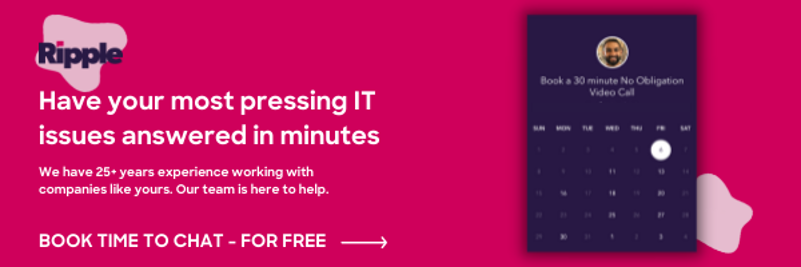
Healthcare organizations face unique challenges when it comes to managing technology. In 2023, healthcare organizations hit the highest numbers ever for most reported data breaches and the most breached records in a year: 725 million and 133 million respectively.
From safeguarding patient data to keeping compliance with regulations like HIPAA and HITRUST, the stakes are high; the average cost of a data breach for a healthcare organization is $11 million.
For hospitals and clinics, being safe means having an IT system in place. Unfortunately, managing complex IT systems in-house can be overwhelming, especially for organizations that need to spend their valuable time focusing on patient care, not ensuring that their systems are up and running.
That’s why many organizations rely on managed IT services for healthcare. By outsourcing IT management to professionals, healthcare providers can get better security, expert support, and scalable solutions that free up time and resources for what matters most: the people they’re taking care of.
What Are Managed IT Services for Healthcare?
Managed IT services for healthcare are third-party IT services that manage a healthcare organization’s internal technology. Here are some of the most common managed IT services for healthcare:
- Data Security and Compliance: Managed IT services keep healthcare organizations compliant with industry regulations like HIPAA so Personal Health Information (PHI) can be safe from cyberattacks. They also use advanced security protocols, regular audits, and continuous compliance monitoring to prevent data breaches.
- Network and Infrastructure Management: Managed IT services handle the day-to-day upkeep of IT infrastructure, keeping your systems up to date and running without disruption.
- Cloud Services and Data Backup: As a healthcare organization, you’re probably relying on the cloud to store your data. Managed IT services secure cloud operations and regular data backups to prevent data loss.
- 24/7 IT Support: Some MSPs provide round-the-clock technical support, reducing downtime and addressing issues before they affect patient care.
- Cybersecurity: 460 ransomware attacks affected the healthcare sector in 2023. Hospitals are prime targets. Managed IT services use security measures like firewalls, encryption, and threat detection to stop attacks on hospital networks.

How Do Managed IT Services for Healthcare Ensure HIPAA Compliance?
Managed IT services for healthcare keep organizations HIPAA compliant by constantly monitoring gaps in a healthcare organization’s data and IT practices and what HIPAA mandates. Here are the things MSPs do to keep healthcare organizations HIPAA-compliant:
- Data Encryption: Managed IT providers encrypt data in transit and at rest so unauthorized access doesn’t occur.
- Regular Audits and Monitoring: One of the main jobs of an MSP is to regularly audit organizations, looking for vulnerabilities or gaps where breaches and attacks could occur. This also helps MSPs see any potential compliance issues before they become a serious problem.
- Access Control: MSPs also keep access controls strict so only your authorized personnel can get to sensitive PHI. This includes using multi-factor authentication (MFA) and role-based access controls.
- Data Backup and Disaster Recovery: To be compliant with HIPAA, healthcare organizations must have backup and disaster recovery plans (BDR) in place. MSPs use healthcare cloud managed services to back up data and recover quickly if a data loss or system failure happens.
- Security Training: 95% of data breaches are caused by human error. A big part of IT services in the healthcare industry is to train teams so they’re aware of HIPAA regulations while following best practices for data security.
- Compliance Documentation: HIPAA requires healthcare organizations to keep documentation including risk assessments, audit logs, and incident reports. MSPs are great resources for storing and backing up those documents.
What Types of Technology Are Included in Managed IT Services for Healthcare?
MSPs cover a wide range of technologies to improve security, efficiency, and compliance for healthcare organizations. Here are a few:
- Electronic Health Records (EHR): MSPs keep EHR systems secure, accessible, and compliant with healthcare regulations like HIPAA.
- Cloud Services: Managed IT services in the healthcare industry provide easy data access, backups, and disaster recovery while maintaining high levels of security in the cloud.
- Cybersecurity Tools: MSPs protect sensitive patient data through firewalls, antivirus software, intrusion detection systems, and encryption.
- Telehealth Platforms: Healthcare organizations can use managed IT services to manage and secure their telehealth systems while meeting compliance regulations and patient confidentiality.
- Network Infrastructure: MSPs build systems that allow for strong, fast, secure, and seamless communication between departments.
- Mobile Device Management (MDM): Patient health information is often accessed through mobile devices by health professionals. Managed IT services use MDM solutions to keep information secure while on the go.
- Compliance Management Software: MSPs use tools to help healthcare organizations continuously comply with HIPAA regulations and avoid penalties.

Technological Challenges in Healthcare
As an industry, healthcare balances patient care with security and compliance requirements that constantly evolve. This is primarily due to one of the biggest challenges facing healthcare: data security.
Why is data security in healthcare so important?
Today, 30% of the world’s data is being generated by healthcare. By 2025, that number will hit 36%.
And, healthcare holds 42 million sensitive data records—50% more than the global average.
With this much sensitive information floating around, compliance and regulations add another layer of complexity. Data storage centers, the cloud, and data access endpoints require constant monitoring and updates to ensure security and compliance.
There are hurdles within healthcare organizations too. Hospitals and clinics often use multiple, disconnected systems for managing patient records, billing, and diagnostics. This makes it hard to share and access information easily.
Choosing The Right Managed IT Services for Healthcare Organizations
Here are key factors to look for when deciding which managed IT service provider to partner with:
- Healthcare Expertise: First, you want a provider who has proven experience working in healthcare. Most importantly, they should know how to deal with healthcare regulations and standards, such as HIPAA, HITECH, and other relevant laws.
- Security Focus: Look for a provider that prioritizes cybersecurity. They should offer advanced security measures such as encryption, multi-factor authentication, intrusion detection systems, and regular security monitoring.
- Responsive Support: Healthcare facilities operate around the clock. You need a provider that is responsive—at the very least.
- Scalability: Your organization will grow. Your IT will need to evolve with it. Choose a provider that uses strategically managed IT services that scale to additional locations, new technologies, or increased patient data.
- Customization and Flexibility: No two healthcare organizations are the same. Managed IT services for healthcare should be personalized. They need to align with your specific goals and the culture of your organization. They should also be flexible enough to provide the support you need, the way you need it.
- Proven Track Record: It’s also a perk if an MSP has reviews, references, and case studies from other healthcare clients. A provider with a history of success is probably more likely to deliver the level of service you need.

The Outlook of Managed IT Services for Healthcare
The future of managed IT services for healthcare looks promising. With the rise of telehealth, remote monitoring, and wearable devices, healthcare organizations rely on scalable IT systems to help them meet their patient’s needs while keeping compliant.
Cybersecurity will remain a top priority, with healthcare continuing to be a prime target for cyberattacks and healthcare organizations spending more on more on cybersecurity each year. Managed IT providers are building cutting-edge security technologies like AI-powered threat detection and real-time monitoring solutions to continually protect patient data.
Automation and AI are also going to be huge in managed IT services for healthcare. Managed service providers will be backbones for healthcare organizations, using their expertise to automate routine tasks, improve diagnostics, and boost administrative efficiency.
Find Managed IT Services for Your Healthcare Organization
Managed IT services for healthcare are crucial for organizations hoping to improve efficiency, keep compliant, and protect their patient’s sensitive data. By offloading the responsibility of IT management to a trusted provider, healthcare facilities can focus on what matters most—delivering quality patient care.
Ripple’s managed IT services have served healthcare for decades. We offer comprehensive solutions that cover everything from data security and HIPAA compliance to healthcare cloud managed services and support.
To set up managed IT services for your healthcare organization, schedule a call with Melissa. She’ll help you answer your most pressing IT question and show you what people-first managed IT services in the healthcare industry look like.
Need to see how we’ve helped healthcare organizations in the past? Read about our experience with the healthcare sanitation company Xenex.
FAQs
What Are the Benefits of Managed It Services for Hospitals?
Managed IT services provide hospitals with enhanced data security, ensuring compliance with regulations like HIPAA. They offer 24/7 support and proactive monitoring to reduce downtime and keep critical systems running smoothly. Additionally, hospitals can benefit from cost savings by outsourcing IT management, while also gaining access to the latest technology without the need for constant in-house updates.
Don't Fall Behind!
Get the latest work-from-home and Humans First® IT tips straight to your inbox.
